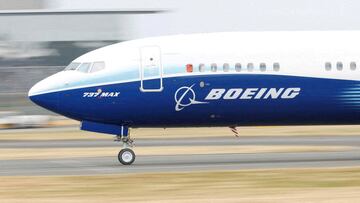Why is Boeing’s stock price down and how can this affect the US economy?
Boeing’s stock price has taken a nose dive after concerns that the company is putting profit over passenger and crew safety come to light.


Since January, several major Boeing failures on aircraft have led the public and regulators to seriously question the safety of the aviation giant’s aircraft. Boeing continues to suffer financial losses as its stock price plummets, having lost 27.74 percent of its value since the beginning of this year. In numerical terms, that is a loss of $69.85 for each share, leaving the price just below $182 on 15 March.
Earlier this week, John Barnett, a former Boeing quality control manager turned whistleblower, was found dead in his car outside of a South Carolina Holiday Inn the day after providing a deposition in the retaliation lawsuit lodged against the company. Barnett’s lawyers found his death extremely surprising, saying that he was in “excellent spirits” after the deposition and that he was “really looking forward to putting this phase of his life behind him.”
Scrutiny on Boeing intensifies
The company came under increased scrutiny in January after a door that had been welded shut fell off of an Alaska Airlines flight in midair. For the passengers on board, none of whom were killed or injured, the event was terrifying and could have ended a lot worse if anyone had been sat in the seat nearest to the departed door. What is even more suspect is the fact that the footage of the aircraft being reformed, including the section that would have been captured by welding the door, was overwritten by Boeing, according to ABC News’ Amanda Maile, Mark Osborne, and Meredith Deliso. National Transportation Safety Board chair Jennifer Homendy testified before Congress that her agency had requested the footage as well as information about the team that worked on the aircraft. The company’s response to the government inquiries has flustered officials, and Boeing executives only created further tensions by saying that they were unaware “of any complaints of concerns about a lack of collaboration.”
The FAA's audit found multiple instances where Boeing and Spirit AeroSystems allegedly failed to comply with manufacturing quality control requirements. We will review all of Boeing’s corrective actions to determine if they fully address our findings. https://t.co/qR11KhvA6W pic.twitter.com/UhOlvrYyjF
— The FAA ✈️ (@FAANews) March 4, 2024
More Perfect Union, the labor-focused news outlet, has proposed nationalizing Boeing and released a video describing how such an action could improve safety.
It might be time for nationalization:https://t.co/n9WPHCURd0
— More Perfect Union (@MorePerfectUS) March 14, 2024
In addition to the investigation by the NTSB, the Federal Aviation Adminstration (FFA) conducted an audit after the event on the aircraft, a 737-9 MAX, and “found multiple instances where the companies allegedly failed to comply with manufacturing quality control requirements. The FFA has mandated that Boeing develop an action plan to address the violations identified in the audit within 90 days and has halted the production of the 737 MAX aircraft.
NTSB schedules investigative hearing on Boeing 737-9 MAX door plug blowout: https://t.co/LpcDtgjMrw pic.twitter.com/2ocup2wtWh
— NTSB Newsroom (@NTSB_Newsroom) March 12, 2024
Related stories
On 12 March, Boeing responded to the FFA’s initial audit findings, describing most of the infractions as having to do with “not following our approved processes and procedures.” Those standard processes and procedures are critical to ensuring the safety of the workers building the aircraft, as well as cabin and tarmac crew as well as passengers. Company executives have implemented additional layers of inspection to improve quality control and target additional support to workers involved in 737 MAX production. Nevertheless, the impact that these measures will have remains to be seen and the FFA has not announced whether or not they are dramatic enough to warrant allowing production on the 737 Max fleet to continue.
Airbus, Boeing’s main rival, has never seen its stock do so well. The US economy could begin to feel a hit if Airbus aircraft began to replace those produced by Boeing on a much larger scale. The sector could see a loss of jobs in the US, and communities that are home to factories could suffer the consequences. It could be years before the full scale of Boeing’s failures are understood, but in the meantime, production on the 737 MAX remains stopped.
Complete your personal details to comment